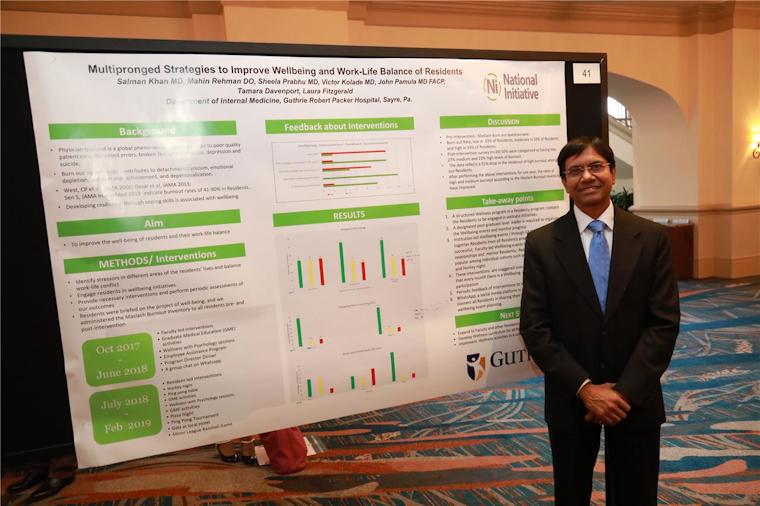John V. Pamula, MD, FACP, led a quality improvement project focused on reducing burnout and increasing well-being among its residents. His poster, Multipronged Strategies to Improve Wellbeing and Work-Life Balance of Residents, was presented at the 2019 Annual Educational Conference, Engaging Each Other: Rediscovering Meaning in Medicine.
Primary Author: John V Pamula, MD, FACP, Guthrie Clinic/Robert Packer Hospital
Co-Authors: Victor Kolade, MD, FACP, Guthrie Clinic/Robert Packer Hospital; Sheela Prabhu, MD, Guthrie Clinic/Robert Packer Hospital; Salman Khan, MD, Guthrie Clinic/Robert Packer Hospital; Mahin Rehman DO, Guthrie Clinic/Robert Packer Hospital; Tamara Davenport, Guthrie Clinic/Robert Packer Hospital, Laura Fitzgerald, MPH, Guthrie Clinic/Robert Packer Hospital
ACGME: Tell us about your academic and professional role:
Pamula: I am Director of QI for Residencies/ Faculty in Internal Medicine Residency at Guthrie/Robert Packer Hospital, in Sayre, Pennsylvania.
ACGME: Can you briefly describe your project for us?
Pamula: Physician burnout is a global phenomenon that can lead to poor quality patient care, increased errors, broken family relationships, depression, and suicide. We aimed to do a Quality Improvement project to improve the well-being of residents and their work-life balance.
We set out to identify stressors in different areas of the residents’ lives and balance work-life conflict. We sought to provide necessary interventions and perform periodic assessments of our outcomes.
Residents were briefed on the project, and we administered the Maslach Burnout Inventory to all residents pre- and post-intervention. The interventions implemented were intended to address various types of stressors, including:
1. Personal - family dinners with faculty to encourage sharing personal stressors
2. Professional - provision of resident mentors
3. Financial - Human Resources and Employee Assistance Program seminars
4. Psychological - monthly confidential (protected from faculty) group sessions by a clinical psychologist who meets with the residents, listens to their stress factors, and teaches coping skills
5. Social - group activities like movie night, painting sessions, group sports such as bowling, cricket, or soccer; and group social media participation
6. Social media connectivity through WhatsApp
ACGME: What inspired you to do this project?
Pamula: This is done as part of Alliance of Independent Academic Medical Centers (AIAMC) National Initiative-6 which is a multi-institutional collaborative in which residents lead multidisciplinary teams in quality improvement projects aligned to their institution’s strategic goals—"Stimulating a culture of well-being in the clinical learning environment.”
ACGME: What did you discover?
Pamula: When we started the project and administered the Maslach Burnout questionnaire, we found that burn out rate was low in 33% of residents, moderate in 33% of residents, and high in 33% of residents.
At the post-intervention survey (n=26), 50% were categorized as having low, 27% medium, and 23% high levels of burnout. The data reflects a 31% drop in the incidence of high burnout among our residents. After performing the above interventions for one year, the rates of high and medium burnout according to the Maslach Burnout Inventory have improved.
ACGME: What were the main takeaways?
Pamula:
1. A structured wellness program in a residency program sends a message to the residents that wellness is being addressed.
2. A designated post-graduate, level-specific leader is required to organize the well-being events and monitor progress.
3. Institution-led well-being events (through GME), faculty-led well-being events to foster relationships and to mentor residents, as well as resident-led events are all important in different ways to curb burnout.
4. These interventions are staggered over the course of the year, so that every month there is some event for resident participation.
5. Periodic assessment of the programs to improve the effectiveness.
6. Residents liked to participate and interact on a daily basis through WhatsApp, a social media platform, to voice their frustrations, jubilations, and dissemination of residents’ news.
ACGME: Who could benefit from this?
Pamula: All residency programs will benefit from a structured wellness program.
ACGME: Any additional follow-up plans?
Pamula: We will have an ongoing wellness program and extend it to all residencies and medical students.
